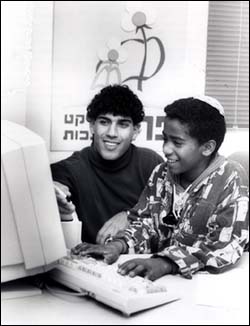
Perach mentor with his young charge
Galit was "the silent one." Ever since the 12-year-old Russian immigrant had arrived in school, she had refused to talk. At last, her teachers turned to Perach, a program that matched Galit with Irit Ben-Simon, a university-age volunteer. With warmth and patience, Irit broke through the silence and helped Galit find her voice.
Galit owed her breakthrough to a chance meeting 25 years ago. Weizmann Institute students Rony and Ruthie Attar were driving home on a rainy winter night when they picked up two youngsters standing by the side of the road. In the conversation that ensued, the hitchhikers admitted they had run away from boarding school. The Attars returned the runaways, but decided to maintain contact, helping them with their homework, taking them on outings, and most importantly, becoming their friends. This simple act of kindness was the seed from which grew Perach, Hebrew for "flower" and the acronym for "tutoring project." The Perach program now reaches out to 45,000 youngsters all over Israel, and for more than 20 years has provided a framework in which college and university students become mentors and positive role models who help at-risk children blossom into adulthood.
Back in 1972, the Attars approached Prof. Haim Harari, then Dean of the Institute's Feinberg Graduate School and now Institute President, for advice on how to turn their effort into a large-scale project. Impressed by their initiative, Harari contacted community educators, heads of universities and government ministers. As a result, two years later, Perach was officially launched with a team of 20 volunteers. Since then, Harari, who now serves as Chairman of Perach's Board of Directors, has seen Perach grow into one of the largest tutoring programs in the world. Its offices, administered by national director Amos Carmeli, are located in the Kugler Perach Office Building on the Weizmann Institute campus.
University students serving as mentors in the program receive a scholarship -- from both public and private funds -- that can cover up to 50 percent of their annual tuition. In return, they commit themselves to meeting with their little "brother" or "sister" twice a week for not less than two hours. The meetings usually take place in the child's home, giving the mentor a first-hand look at the family environment. In addition to helping with homework and school projects, mentors try to expand their charges' horizons with outings to libraries, museums and parks.
Children assigned to Perach mentors are usually chosen by the school. However, in many cases, a child's poor adjustment can be traced to an abusive or neglectful home life. Consequently, the mentor's mission goes beyond academics. At the core of the program's philosophy is the belief that every child deserves personal attention, and that a positive, informal relationship can lead to a better self-image and improved chances for the future.
Perach is funded in part by the Clore Foundation, U.K; the Delek Foundation for Science, Education and Culture, Israel; the Abraham and Sonia Rochlin Foundation, Reno, Nevada; the South African Zionist Federation, Israel; and the Yad Avi Ha-Yishuv Foundation, Israel.
